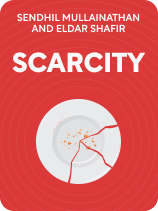

This article is an excerpt from the Shortform book guide to "Scarcity" by Sendhil Mullainathan and Eldar Shafir. Shortform has the world's best summaries and analyses of books you should be reading.
Like this article? Sign up for a free trial here.
How does a lack of money affect economic decision-making? Why are poor people more rational decision-makers?
According to behavioral science researchers Sendhil Mullainathan and Eldar Shafir, financial scarcity forces people to become experts at making a dollar stretch further. As a result, poor people tend to make more rational economic decisions.
Here’s how a lack of money affects economic decision-making.
Using Scarce Money Efficiently
In their book Scarcity, Mullainathan and Shafir explain that poor people tend to make more rational economic decisions because scarcity forces them to make every dollar count. With each purchase, they have to consider what else they’ll have to give up to cover the cost. On the other hand, when we have enough money that we don’t have to analyze every dollar spent, we’re more susceptible to biases and inconsistencies.
(Shortform note: Although the authors don’t explicitly mention this nuance, their argument here only seems to apply to economic decision-making with short-term consequences, like buying a cheaper item in a grocery store, which results in immediate savings. Later, the authors argue that poor people make worse economic decisions in situations where there are long-term consequences to consider, like taking out loans.)
For example, wealthy people (those who don’t experience scarcity when it comes to money) are more susceptible to relativity bias. This is the phenomenon where someone is willing to go out of their way to save $5 on a $20 purchase, but not willing to do so to save $5 on a $100 purchase. The savings are the same in both situations, but the lower relative savings as a proportion of the total cost makes wealthier people feel like it’s not worth the effort.
(Shortform note: Relativity bias causes people to make irrational economic decisions in many different types of scenarios where we assess how good a deal is based on comparisons. In Predictably Irrational, Dan Ariely explains that retailers often take advantage of this tendency by presenting a decoy product with a much higher price than another similar product. By comparison, the cheaper product is much more appealing to customers, regardless of its actual value.)
Mullainathan and Shafir write that poor people are also more aware of the prices they’re paying, they’re conscious of when they save or lose money by buying a larger volume, and they’re more likely to factor in the opportunity cost of an activity (what you lose by not doing something different). For example, they’re more likely to be aware that commuting a long distance to purchase an item on sale may not be worth the time they could spend doing other things, like working, if they purchase it somewhere closer.
(Shortform note: Contrary to the authors’ research, one study showed that people of all income levels tend to neglect opportunity costs. However, the researchers noted that aspects of the study design may have skewed the data. For example, the participants may not have been poor enough for there to be a significant difference in the groups. Furthermore, the study involved a hypothetical situation that may have caused low-income people to neglect the opportunity cost more than they would in a real-life scenario.)

———End of Preview———
Like what you just read? Read the rest of the world's best book summary and analysis of Sendhil Mullainathan and Eldar Shafir's "Scarcity" at Shortform.
Here's what you'll find in our full Scarcity summary:
- An exploration of the good and bad sides of a scarcity mindset
- Strategies to counteract the negative cognitive effects of scarcity
- How policymakers should redesign social programs






